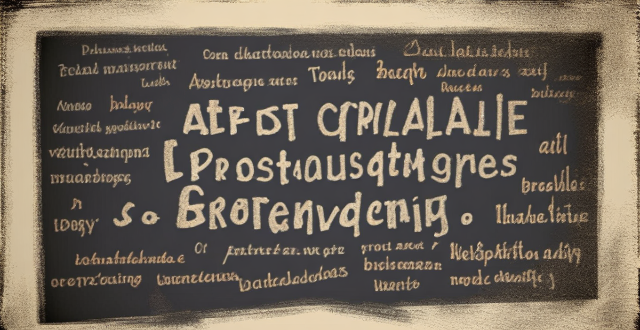The article discusses the crucial role of vocabulary in understanding complex texts. It emphasizes that a strong vocabulary enhances word recognition, contextual understanding, and inferencing abilities, which lead to improved reading speed, greater comprehension, and enhanced critical thinking skills. The article also provides strategies for building vocabulary, such as reading widely, using flashcards or apps, and practicing with new words.

The Impact of Vocabulary on Understanding Complex Texts
Introduction
Vocabulary is an essential component of language proficiency. It plays a crucial role in understanding complex texts, as it provides the building blocks for comprehension. In this article, we will explore how one's vocabulary impacts their ability to understand complex texts.
The Role of Vocabulary in Comprehension
1. Word Recognition
The first step in understanding any text is recognizing the words used within it. A strong vocabulary allows readers to quickly identify and understand the meaning of words, which facilitates faster reading and better comprehension. Without a sufficient vocabulary, readers may struggle to recognize unfamiliar words, leading to confusion and misinterpretation of the text.
2. Contextual Understanding
A rich vocabulary also enables readers to understand the context in which words are used. Many words have multiple meanings, and their significance often depends on the context in which they appear. Readers with a broad vocabulary can more easily discern the intended meaning of a word based on its surrounding words and the overall message of the text.
3. Inferencing
When encountering unfamiliar words or phrases, readers with a robust vocabulary can use their existing knowledge to make educated guesses about the meaning of these elements. This process, known as inferencing, allows readers to continue understanding the text even when they come across new or challenging vocabulary.
Benefits of a Strong Vocabulary
1. Improved Reading Speed
Readers with a large vocabulary can read more quickly because they spend less time trying to decipher the meaning of unfamiliar words. This increased speed allows them to process more information in less time, which is particularly beneficial when dealing with complex texts that require careful analysis.
2. Greater Comprehension
A well-developed vocabulary leads to better overall comprehension of complex texts. Readers who understand most of the words they encounter can focus on analyzing the content and structure of the text rather than getting bogged down by individual word meanings.
3. Enhanced Critical Thinking
Having a strong vocabulary also enhances critical thinking skills. It allows readers to evaluate arguments and evidence presented in complex texts more effectively, as they have a deeper understanding of the language used to convey ideas.
Strategies for Building Vocabulary
1. Read Widely
Reading a variety of materials, such as books, newspapers, magazines, and online articles, exposes readers to different styles of writing and diverse vocabularies. This exposure helps expand their own vocabulary by introducing them to new words and contexts in which those words are used.
2. Use Flashcards or Apps
Utilizing flashcards or vocabulary-building apps can be an effective way to learn and retain new words. These tools provide repetition and practice, which are essential for long-term memory retention.
3. Practice Using New Words
Incorporating newly learned words into everyday conversations and writing helps reinforce their meaning and usage. By actively using these words, readers become more comfortable with them and are more likely to remember them when encountering them in complex texts.
Conclusion
In conclusion, one's vocabulary significantly impacts their ability to understand complex texts. A strong vocabulary enhances word recognition, contextual understanding, and inferencing abilities, leading to improved reading speed, greater comprehension, and enhanced critical thinking skills. By employing strategies like reading widely, using flashcards or apps, and practicing with new words, individuals can build and maintain a robust vocabulary that supports their success in understanding complex texts.